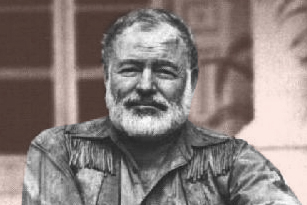
Writing with characteristic bluntness to his editor Maxwell Perkins, Ernest Hemingway pauses work on his nonfiction book about bullfighting, Death in the Afternoon, to deal with matters related to Scribner’s 1930 reprint of his first story collection, In Our Time.
[Nordquist Ranch, Wyoming]
[12 August 1930]
Dear Max:
Have gone over the I.O.T. also the Up in Michigan. I’ve rewritten it to try and keep it from being libelous but to do so takes all its character away. It clearly refers to two people in a given town, both of them still alive, still living there and easily identified. If I take the town away it loses veracity. But I can leave out enough of the first part to eliminate libel. However I know you will not publish it with the last part entire and if any of that is cut out there is no story…
What I would suggest is that you get Edmund Wilson, if he is willing, to write an introduction to the In Our Time. He is, of all critics or people, the one who has understood best what I am working at and I know an introduction by him would be of much value to the book as you are getting it out now. As I understand it you are getting it out somewhat as a new book i.e. you want new material from me and it is not fair to do this without explanation since it is not new but my first and earliest book. I’ll be damned if I will write a preface but Wilson, if he would, could write what it would need as an introduction. If he wouldn’t care to it would be better to have none…
Please let me know what you think of this.
I know I am not going in for putting out books because there should be something from me on the Scribners list. The In Our Time is, I really believe, a hell of a good book—the stories, when I read them now, are as good as ever—and worth anyone’s two dollars but I am not going to jazz it up with anything of another period and try to make it sell as a new book…What it needs—the In Our Time—is a good introduction. What you are doing is making it really available for the first time to the people who have read the other books. I am too busy, too disinterested, too proud or too stupid or whatever you want to call it to write one for it…
However we had better figure out a formula to put in the front about no living persons which will absolutely prevent libel as there are three people who might, if they were in desperate enough straits and the book sufficiently prominent, try a libel action. The reason most of the book seems so true is because most of it is true and I had no skill then, nor have much now, at changing names and circumstances. Regret this very much.
Am going well on the new book [Death in the Afternoon]. Have something over 40,000 words done. Have worked well 6 days of every week since got here. Have 6 more cases of beer good for 6 more chapters. If I put in an expense account on this bull fight book it would be something for the accounting Dept to study.
The checks came and your letter with them. Thanks ever so much—also for the telegram about G. and D. jacket. I hated like hell to bother you about that—you have enough to worry about without Grossett and Dunlop. I’m so sorry to hear bad news of [F.] Scott [Fitzgerald]. Please let me know what you hear and let me know anything you think of that I can do. I’d go over [to France] if you think it would do any good.
Best to you always. Please if I speak rudely in letters never take it personally. I’m working damned hard and a letter about some bloody problem or other is only a damned interruption and curse. Don’t let me get on your nerves. We’ll have a good time in March at Tortugas!
Yours always
Ernest
From Ernest Hemingway Selected Letters 1917-1961. Edited by Carlos Baker. New York: Charles Scribner’s Sons, 1981. 948 pp.
FURTHER READING
As Hemingway requested, Edmund Wilson did write the introduction to In Our Time. To read excerpts from his 1939 essay “Ernest Hemingway” as well as other critics’ perspectives, click here.
For the New York Times’ 1932 review of Death in the Afternoon, click here.


